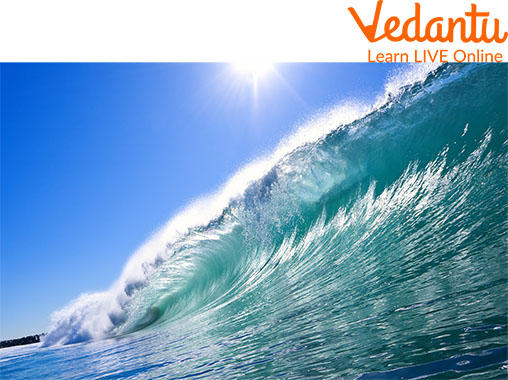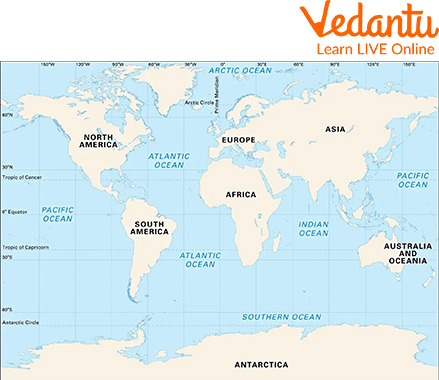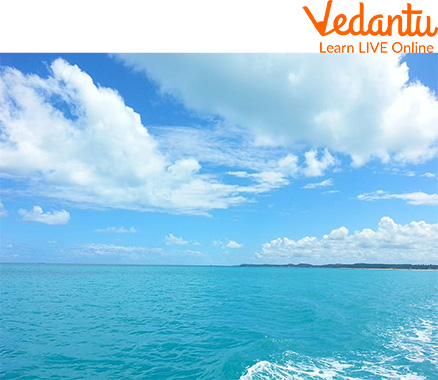




Overview of Ocean for Kids
Have you ever wondered what secrets the world's oceans hold in them? Oceans are very vast and complicated and also out of reach for humans. Oceans have been home to various organisms since the origin of life on earth. It is also believed that life has arrived from the oceans themselves, which implies how important oceans have been in the course of evolution. Oceans have been a huge area of research for several scientists and curious minds.
In this article, we will learn more ocean facts for preschoolers and science kids ocean. So without further ado, let's start learning about the oceans of the planet.

Ocean
Ocean For Kids
Here, we will look at facts about ocean water and learn about the ocean for kids.
Firstly, what is an ocean? A vast expanse of saline or salty water is known as an ocean. Nearly 71 per cent of the surface of our planet is made up of oceans. Almost 98 per cent of the water on Earth is contained in them. The Pacific, Atlantic, Indian, Arctic, and Southern, or the Antarctic, oceans are the 5 primary regions that make up the entire world's oceans.
They can be viewed as a single ocean because water freely moves between them, and there are no obvious boundaries. Seas, gulfs, and bays are smaller sections or miniature portions of these oceans.

Seven Oceans of the World
Seawater is usually saline in nature. It is filled up with a chemical called sodium chloride, which is dissolved in ocean’s waters. It is the source of its saltiness.
Ocean Fun Facts
Here are some ocean fun facts. The movement of ocean water is primarily influenced by the movement of the winds. Ocean currents are the movement of a large volume of water from oceans across the earth. These currents can be of 3 types: warm, cold or mild currents. Mild currents are the ones that bring rain. Huge oceanic waves are a result of strong winds, whereas a ripple in the water is produced by light winds.
Most people over the world believe that ocean water is faint blue or transparent in colour. It usually reflects the colour of the sky and appears to be blue.

Clouds over the Ocean
Fun Ocean Information
Let's learn more facts about the ocean for kids. Given below are some fun facts.
Oceans all over the world have a moderate depth of about 12,200 feet.
From its base, the Hawaiian peak Mauna Kea rises 33,474 feet. If its floor weren't below sea level, this peak would be the most elevated on the planet.
Oceans surround over 97 per cent of the planet's surface.
The majority of individuals on Earth reside 60 miles or less from an ocean shore.
The Mid-Atlantic Ridge is the longest mountain range in the world, and it lies beneath the water.
Summary
To conclude all the learnings from this article, we can say that oceans have been a place to live for various organisms. They have produced the oxygen that we breathe through the plants that live inside and also provide us with various materials on which our life depends. With this, we hope that we were able to clear all doubts regarding oceans.
FAQs on Unbelievable Facts About Oceans for Kids
1. Why is the ocean so important to us?
Oceans generate about 50% to 80% of the oxygen (they generate oxygen through plants that live in it, these plants release oxygen as a byproduct of photosynthesis) that we consume daily for breathing. If there were no oxygen, he would not be able to survive. Therefore, oceans are very important for human life and other life forms that depend on oxygen coming from them.
2. Which ocean is known as the largest ocean in the world?
The Pacific Ocean is the largest ocean on planet Earth. It covers about 63 million square miles of the earth's surface. It is so huge that all the earth's continents can fit in it.
3. Are seas and oceans the same thing?
No, seas and oceans are not the same things but are frequently used as similar terms. But scientifically, oceans are larger than the seas. The oceans cover a huge surface of the planet earth, while seas are the smaller forms of the oceans that are left out near the shores or banks of islands and land masses.









